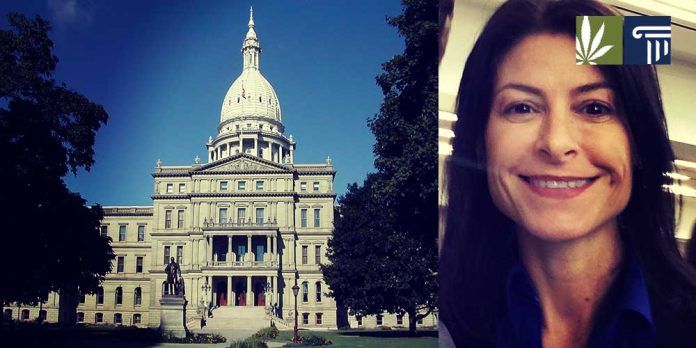My favorite Red Wing; hands down..... I'm so happy to see him turn his life around.
Former Red Wing Darren McCarty joins marijuana company, says pot saved his life
Red Wings hockey star Darren McCarty already has four Stanley Cups under his belt, but that’s not enough.
He wants a fifth cup with a new team that won’t require him to lace up his skates.
McCarty has formed a collaboration with Pincanna, a cannabis company that is building a massive medical marijuana grow and processing operation along I-75 in Pinconning, north of Bay City. And McCarty hopes one day to win a Cannabis Cup — a marijuana competition that is held all over the United States to rate different pot products — with his own strains of legal weed.
Former Red Wing Darren McCarty speaks about his new marijuana venture during an interview at his podcast studio in Franklin on Wednesday, August 21, 2019. (Photo: Junfu Han, Detroit Free Press)
By working with the company, McCarty wants to broaden the advocacy he already has been doing since he kicked his addiction to alcohol in 2015 with the help of pot. While he has grown his own pot outdoors, he’s leaving the cultivating, processing and retail sales to the experts and will lend his name instead to products ranging from a CBD rub and gummy, to a mellowing strain of marijuana and a high-potency, marijuana-infused chocolate peanut-butter candy bar that will “crush” those who choose to indulge.
“I have a couple of ideas for the names (of the marijuana strains). Something to do with four cups, maybe sweet revenge,” McCarty said, referring to his now infamous fight with Colorado Avalanche forward Claude Lemieux, whom he pummeled in 1997 in retaliation for Lemieux's brutal attack on Red Wings' teammate Kris Draper in 1996. “The names will come from some pretty big moments that I’ve had.”
Referring to Pincanna, which also plans to open dispensaries in Kalkaska, East Lansing and Albion, he said, “I'm a four-time Stanley Cup winner, they’re a 45-time Cannabis Cup winner. I'm going to be the first athlete with a Stanley Cup and a Cannabis Cup.”
McCarty met with the Free Press last week before taping his podcast, “Grind Time with Darren McCarty,” at a recording studio in Franklin.
Darren McCarty with his then 5-year-old son, Griffin on his shoulders raises the Stanley Cup during post game celebrations after their Game 5 win over the Carolina Hurricanes in 2002. (Photo: Julian H. Gonzalez, Detroit Free Press)
The former Red Wing certainly had success in his 13 seasons with the team as an on-ice enforcer and member of the Grind Line — along with Kris Draper, Joe Kocur and Kirk Maltby — that thwarted the offensive threats from other teams and protected the Red Wings’ scoring stars. McCarty quickly became a fan favorite, known more for his epic brawls on the ice. But he was an offensive threat too, scoring 127 goals, 161 assists and 288 points during his 13 seasons with the Red Wings and two with the Calgary Flames.
And since becoming a leading voice on marijuana, claiming the plant saved his life from certain death because of alcoholism and drug addiction, he hopes to translate his athletic success to the cannabis industry.
It was Nov. 11, 2015, when his blood pressure was spiking and he said his liver was about to explode after decades of abusing alcohol, with Jack Daniels and beer his drinks of choice, that McCarty had his come-to-Jesus moment. The battle with the bottle led to four stints in rehab, a variety of court battles and the end of two marriages.
Darren McCarty speaks to Free Press reporter during an interview at his podcast studio in Franklin, Wednesday, August 21, 2019. (Photo: Junfu Han, Detroit Free Press)
“For me, growing up, you were either a jock or stoner, so I never smoked pot growing up, but I’ve been drinking since I was 12 or 13 years old. That was acceptable in the hockey circles, it's just culturally what was accepted,” McCarty said. “So I would always say no to pot, until after my first surgery in 1999. I was on all these pills, and it was driving me crazy. And I'm an insomniac, so I can't sleep, and that had a lot to do with all the drinking.”
A friend suggested he try some weed and “something went off in my head and it was like my body said yes.”
But it didn’t stop him from drinking to the point of collapse and several buddies, including the medical marijuana caregiver who supplied him with pot, isolated him, and for seven days, gave him “gram after gram” of Rick Simpson Oil, a potent marijuana concentrate created by Canadian Rick Simpson in 2003 to treat his skin cancer.
“I was in a coma and when I woke up after seven days, I didn't have a physical addiction,” McCarty said. “I dropped to my knees and said, 'Thank God.' '”
He hasn’t had a drink since, has lost 60 pounds, is off most of his prescription medications and has quit smoking cigarettes.
“If you've seen my progress over the past 10 years, you've seen me go through different stages from the alcoholism, which led me to this plant saving my life,” said the 47-year-old Madison Heights resident. “I feel like I’m 35. I’m not lying. I feel like Benjamin Button.”
But he’s also smoking a lot of pot every day. From getting up in the morning and taking 100 milligrams of CBD, the nonintoxicating element of the cannabis plant, to smoking a few joints to get him going “because that’s like a glass of orange juice,” he said, and then a few more to relax and ultimately to go to sleep at night.
“So I smoked this morning and then I smoked on the way to the golf course and I smoked one on the golf course,” he said, recounting his day. “And I’ll probably smoke when we’re done with this interview. And I was at High Times (a cannabis competition in Detroit) all weekend, so my system’s pretty rockin’ anyways.”
He bristles at the suggestion that he might have just traded one substance — alcohol — for another — marijuana.
“No, because it's a plant,” he said. “I live my life by the principles, the 12 steps. But you know what? There's a friggin’ garden in my program.
“And the bottom line is, I'm not drinking. I'm not doing coke. I'm not doing pills. I'm not smoking cigarettes. In my book, what you think about me is none of my business because I know I'm right. The big fella told me so,” McCarty said, pointing skyward.
Now, alcohol “repulses” him because he knows how the story ends if he goes back to the bottle. He instead wants to write the new chapter.
“Yeah, I’m a stoner, but I’m a sophisticated stoner.”



